The Role of External Auditing in Promoting Corporate Accountability
VerifiedAdded on 2023/04/08
|9
|1905
|385
Essay
AI Summary
This essay critically discusses the role of external auditors in promoting corporate accountability within business organizations. It highlights the responsibilities of auditors in preventing, detecting, and reporting financial fraud, errors, and illegal acts, emphasizing their role in confirming the accountability and stewardship of management. The discussion covers various aspects such as protecting the interests of shareholders by maintaining audit independence, reporting on the financial standing of companies, ensuring compliance with accounting principles, assessing organizational risks, developing crisis management plans, and maintaining relations with regulators. The essay concludes that external auditors promote corporate accountability by safeguarding stakeholder interests, preventing financial manipulations, and ensuring transparency in financial reporting, thereby fostering trust and confidence in the financial information provided by companies.
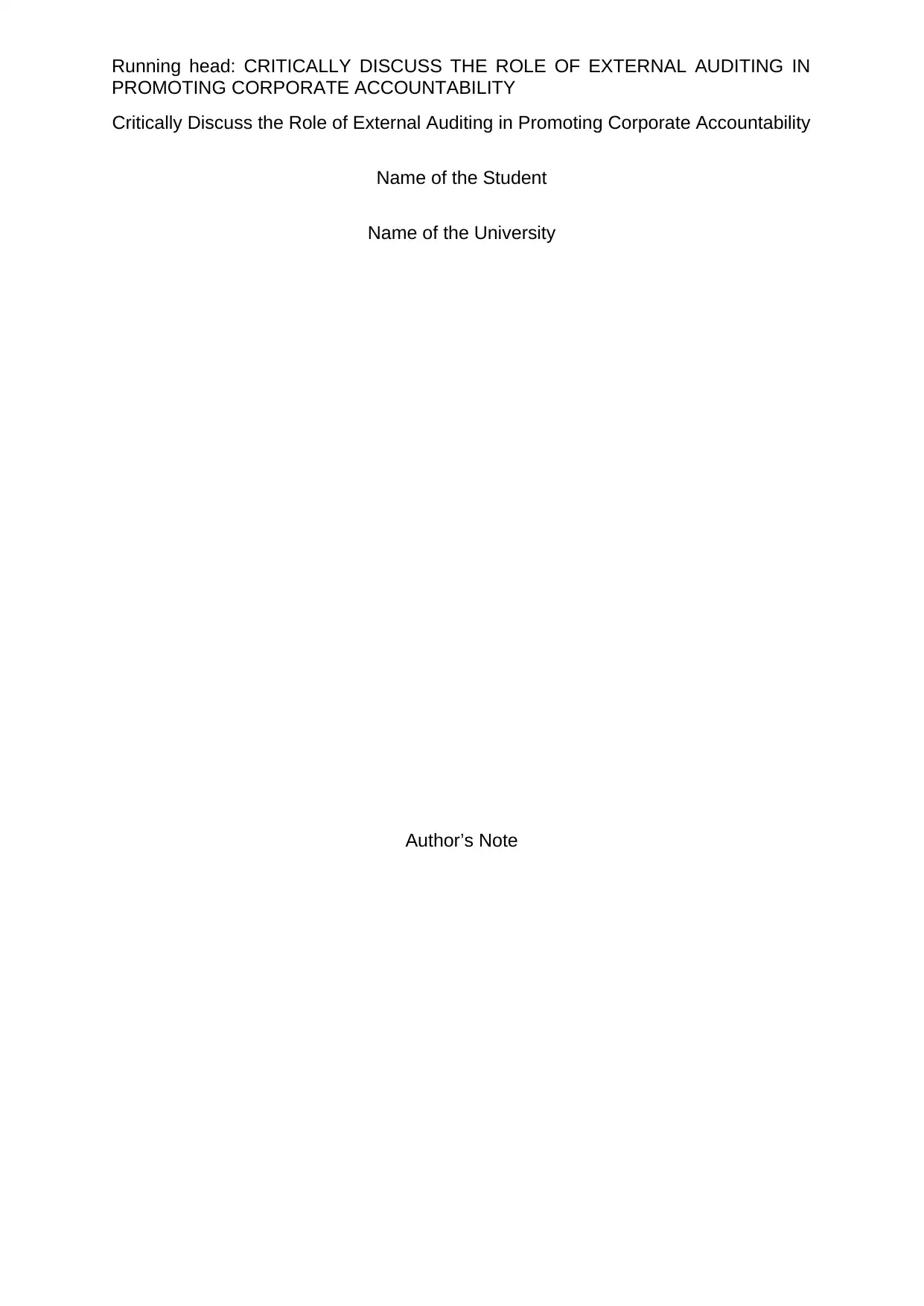
Running head: CRITICALLY DISCUSS THE ROLE OF EXTERNAL AUDITING IN
PROMOTING CORPORATE ACCOUNTABILITY
Critically Discuss the Role of External Auditing in Promoting Corporate Accountability
Name of the Student
Name of the University
Author’s Note
PROMOTING CORPORATE ACCOUNTABILITY
Critically Discuss the Role of External Auditing in Promoting Corporate Accountability
Name of the Student
Name of the University
Author’s Note
Paraphrase This Document
Need a fresh take? Get an instant paraphrase of this document with our AI Paraphraser
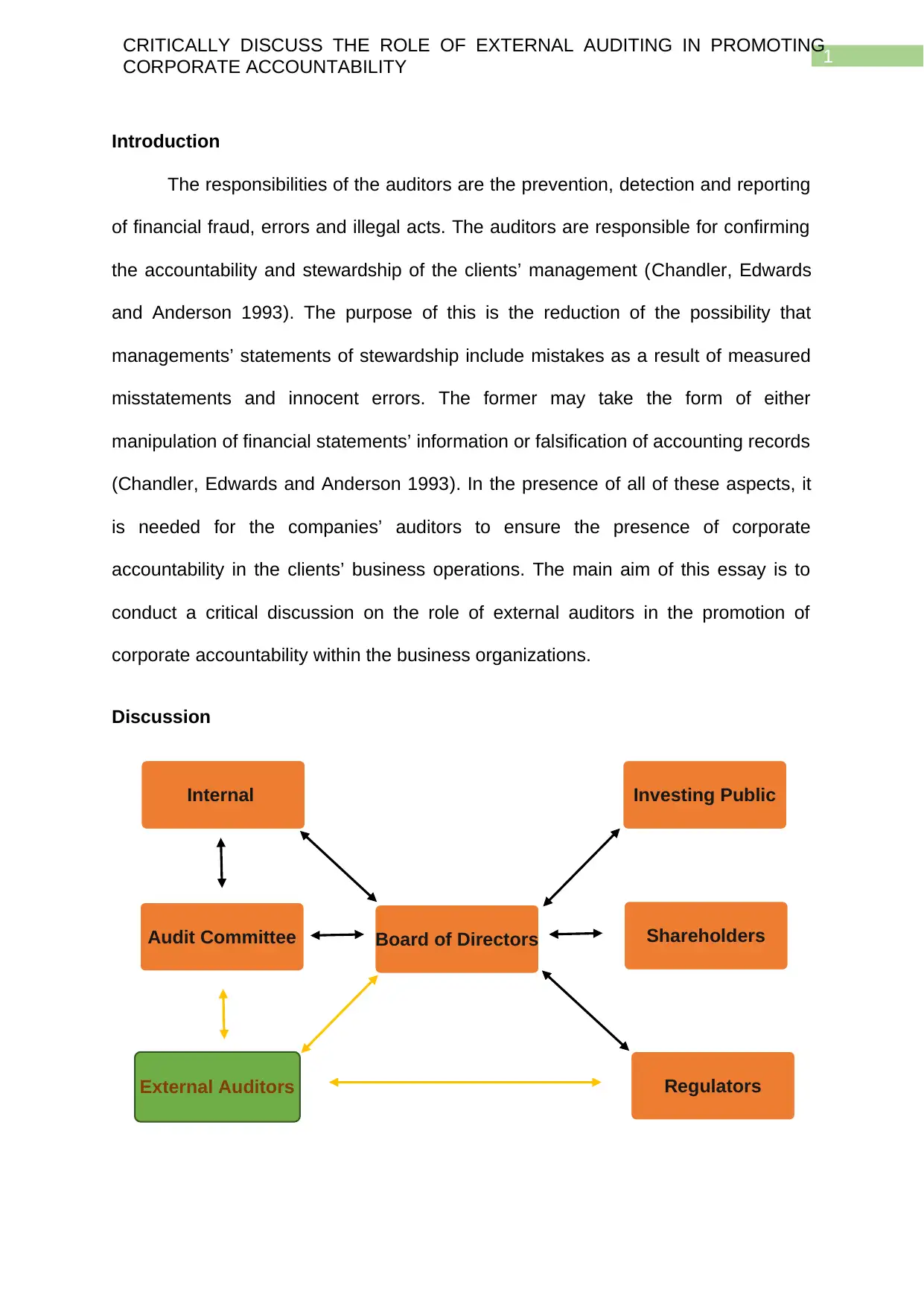
1
CRITICALLY DISCUSS THE ROLE OF EXTERNAL AUDITING IN PROMOTING
CORPORATE ACCOUNTABILITY
Board of Directors
Investing Public
External Auditors Regulators
Internal
ShareholdersAudit Committee
Introduction
The responsibilities of the auditors are the prevention, detection and reporting
of financial fraud, errors and illegal acts. The auditors are responsible for confirming
the accountability and stewardship of the clients’ management (Chandler, Edwards
and Anderson 1993). The purpose of this is the reduction of the possibility that
managements’ statements of stewardship include mistakes as a result of measured
misstatements and innocent errors. The former may take the form of either
manipulation of financial statements’ information or falsification of accounting records
(Chandler, Edwards and Anderson 1993). In the presence of all of these aspects, it
is needed for the companies’ auditors to ensure the presence of corporate
accountability in the clients’ business operations. The main aim of this essay is to
conduct a critical discussion on the role of external auditors in the promotion of
corporate accountability within the business organizations.
Discussion
CRITICALLY DISCUSS THE ROLE OF EXTERNAL AUDITING IN PROMOTING
CORPORATE ACCOUNTABILITY
Board of Directors
Investing Public
External Auditors Regulators
Internal
ShareholdersAudit Committee
Introduction
The responsibilities of the auditors are the prevention, detection and reporting
of financial fraud, errors and illegal acts. The auditors are responsible for confirming
the accountability and stewardship of the clients’ management (Chandler, Edwards
and Anderson 1993). The purpose of this is the reduction of the possibility that
managements’ statements of stewardship include mistakes as a result of measured
misstatements and innocent errors. The former may take the form of either
manipulation of financial statements’ information or falsification of accounting records
(Chandler, Edwards and Anderson 1993). In the presence of all of these aspects, it
is needed for the companies’ auditors to ensure the presence of corporate
accountability in the clients’ business operations. The main aim of this essay is to
conduct a critical discussion on the role of external auditors in the promotion of
corporate accountability within the business organizations.
Discussion
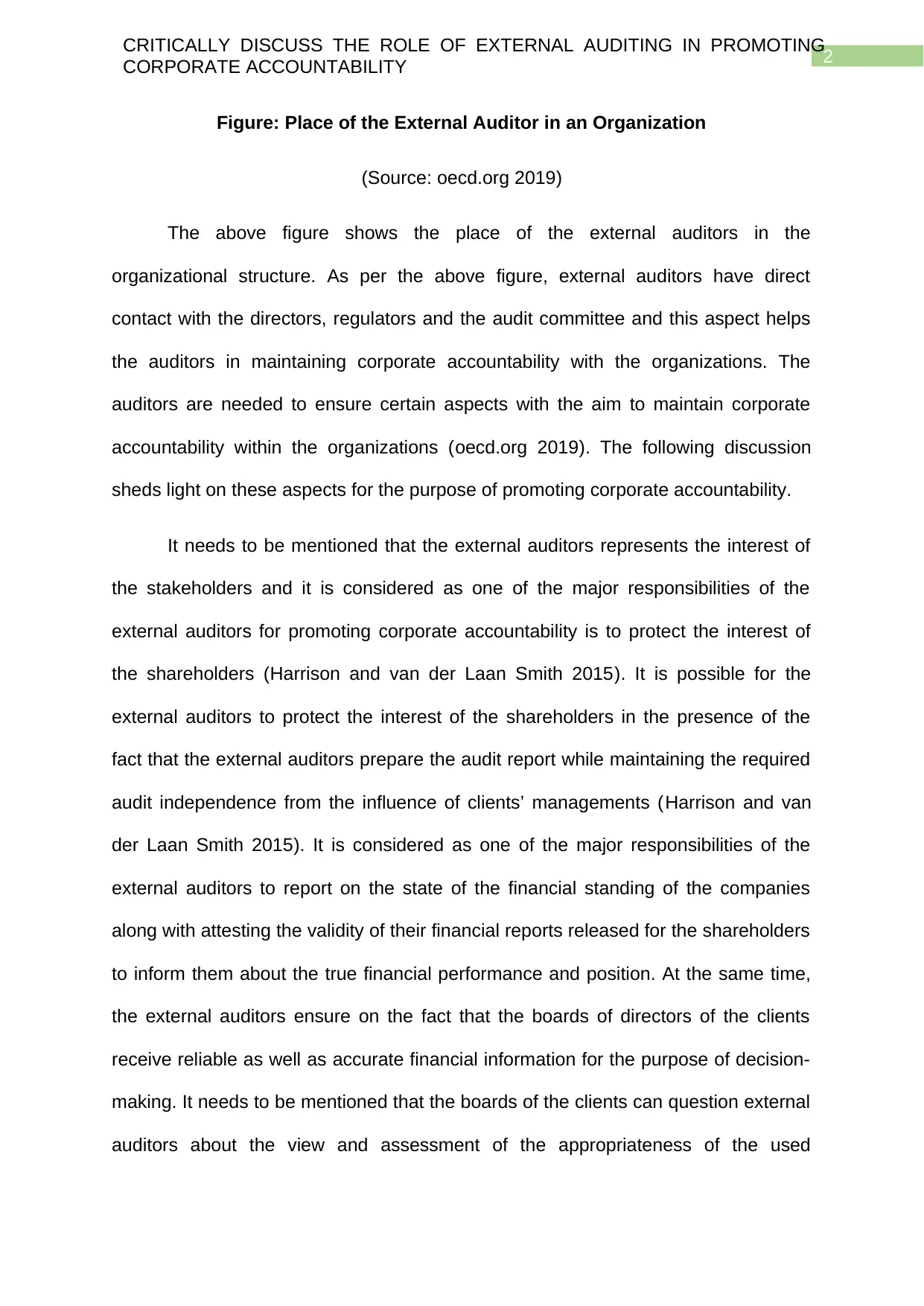
2
CRITICALLY DISCUSS THE ROLE OF EXTERNAL AUDITING IN PROMOTING
CORPORATE ACCOUNTABILITY
Figure: Place of the External Auditor in an Organization
(Source: oecd.org 2019)
The above figure shows the place of the external auditors in the
organizational structure. As per the above figure, external auditors have direct
contact with the directors, regulators and the audit committee and this aspect helps
the auditors in maintaining corporate accountability with the organizations. The
auditors are needed to ensure certain aspects with the aim to maintain corporate
accountability within the organizations (oecd.org 2019). The following discussion
sheds light on these aspects for the purpose of promoting corporate accountability.
It needs to be mentioned that the external auditors represents the interest of
the stakeholders and it is considered as one of the major responsibilities of the
external auditors for promoting corporate accountability is to protect the interest of
the shareholders (Harrison and van der Laan Smith 2015). It is possible for the
external auditors to protect the interest of the shareholders in the presence of the
fact that the external auditors prepare the audit report while maintaining the required
audit independence from the influence of clients’ managements (Harrison and van
der Laan Smith 2015). It is considered as one of the major responsibilities of the
external auditors to report on the state of the financial standing of the companies
along with attesting the validity of their financial reports released for the shareholders
to inform them about the true financial performance and position. At the same time,
the external auditors ensure on the fact that the boards of directors of the clients
receive reliable as well as accurate financial information for the purpose of decision-
making. It needs to be mentioned that the boards of the clients can question external
auditors about the view and assessment of the appropriateness of the used
CRITICALLY DISCUSS THE ROLE OF EXTERNAL AUDITING IN PROMOTING
CORPORATE ACCOUNTABILITY
Figure: Place of the External Auditor in an Organization
(Source: oecd.org 2019)
The above figure shows the place of the external auditors in the
organizational structure. As per the above figure, external auditors have direct
contact with the directors, regulators and the audit committee and this aspect helps
the auditors in maintaining corporate accountability with the organizations. The
auditors are needed to ensure certain aspects with the aim to maintain corporate
accountability within the organizations (oecd.org 2019). The following discussion
sheds light on these aspects for the purpose of promoting corporate accountability.
It needs to be mentioned that the external auditors represents the interest of
the stakeholders and it is considered as one of the major responsibilities of the
external auditors for promoting corporate accountability is to protect the interest of
the shareholders (Harrison and van der Laan Smith 2015). It is possible for the
external auditors to protect the interest of the shareholders in the presence of the
fact that the external auditors prepare the audit report while maintaining the required
audit independence from the influence of clients’ managements (Harrison and van
der Laan Smith 2015). It is considered as one of the major responsibilities of the
external auditors to report on the state of the financial standing of the companies
along with attesting the validity of their financial reports released for the shareholders
to inform them about the true financial performance and position. At the same time,
the external auditors ensure on the fact that the boards of directors of the clients
receive reliable as well as accurate financial information for the purpose of decision-
making. It needs to be mentioned that the boards of the clients can question external
auditors about the view and assessment of the appropriateness of the used
⊘ This is a preview!⊘
Do you want full access?
Subscribe today to unlock all pages.

Trusted by 1+ million students worldwide
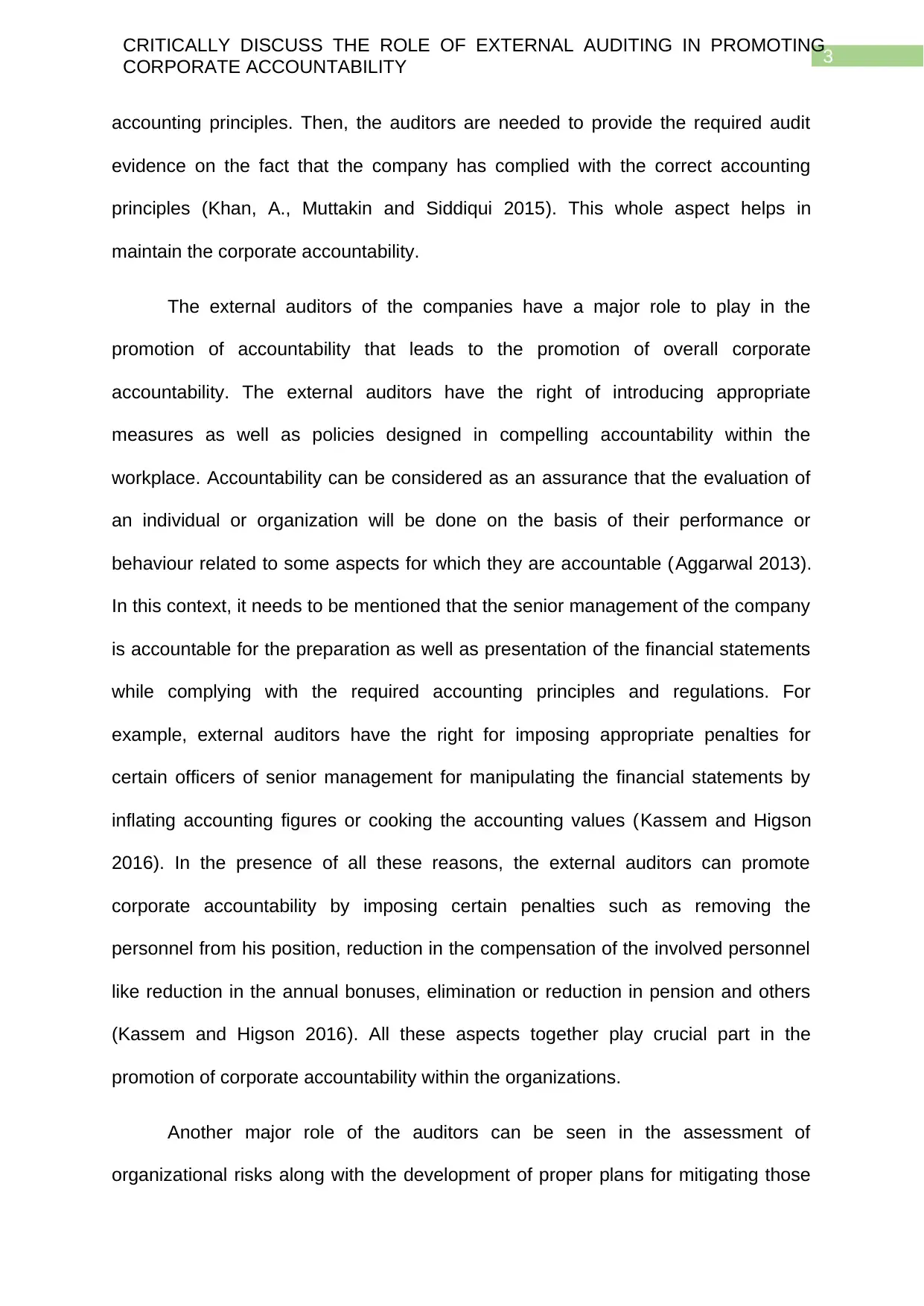
3
CRITICALLY DISCUSS THE ROLE OF EXTERNAL AUDITING IN PROMOTING
CORPORATE ACCOUNTABILITY
accounting principles. Then, the auditors are needed to provide the required audit
evidence on the fact that the company has complied with the correct accounting
principles (Khan, A., Muttakin and Siddiqui 2015). This whole aspect helps in
maintain the corporate accountability.
The external auditors of the companies have a major role to play in the
promotion of accountability that leads to the promotion of overall corporate
accountability. The external auditors have the right of introducing appropriate
measures as well as policies designed in compelling accountability within the
workplace. Accountability can be considered as an assurance that the evaluation of
an individual or organization will be done on the basis of their performance or
behaviour related to some aspects for which they are accountable (Aggarwal 2013).
In this context, it needs to be mentioned that the senior management of the company
is accountable for the preparation as well as presentation of the financial statements
while complying with the required accounting principles and regulations. For
example, external auditors have the right for imposing appropriate penalties for
certain officers of senior management for manipulating the financial statements by
inflating accounting figures or cooking the accounting values (Kassem and Higson
2016). In the presence of all these reasons, the external auditors can promote
corporate accountability by imposing certain penalties such as removing the
personnel from his position, reduction in the compensation of the involved personnel
like reduction in the annual bonuses, elimination or reduction in pension and others
(Kassem and Higson 2016). All these aspects together play crucial part in the
promotion of corporate accountability within the organizations.
Another major role of the auditors can be seen in the assessment of
organizational risks along with the development of proper plans for mitigating those
CRITICALLY DISCUSS THE ROLE OF EXTERNAL AUDITING IN PROMOTING
CORPORATE ACCOUNTABILITY
accounting principles. Then, the auditors are needed to provide the required audit
evidence on the fact that the company has complied with the correct accounting
principles (Khan, A., Muttakin and Siddiqui 2015). This whole aspect helps in
maintain the corporate accountability.
The external auditors of the companies have a major role to play in the
promotion of accountability that leads to the promotion of overall corporate
accountability. The external auditors have the right of introducing appropriate
measures as well as policies designed in compelling accountability within the
workplace. Accountability can be considered as an assurance that the evaluation of
an individual or organization will be done on the basis of their performance or
behaviour related to some aspects for which they are accountable (Aggarwal 2013).
In this context, it needs to be mentioned that the senior management of the company
is accountable for the preparation as well as presentation of the financial statements
while complying with the required accounting principles and regulations. For
example, external auditors have the right for imposing appropriate penalties for
certain officers of senior management for manipulating the financial statements by
inflating accounting figures or cooking the accounting values (Kassem and Higson
2016). In the presence of all these reasons, the external auditors can promote
corporate accountability by imposing certain penalties such as removing the
personnel from his position, reduction in the compensation of the involved personnel
like reduction in the annual bonuses, elimination or reduction in pension and others
(Kassem and Higson 2016). All these aspects together play crucial part in the
promotion of corporate accountability within the organizations.
Another major role of the auditors can be seen in the assessment of
organizational risks along with the development of proper plans for mitigating those
Paraphrase This Document
Need a fresh take? Get an instant paraphrase of this document with our AI Paraphraser
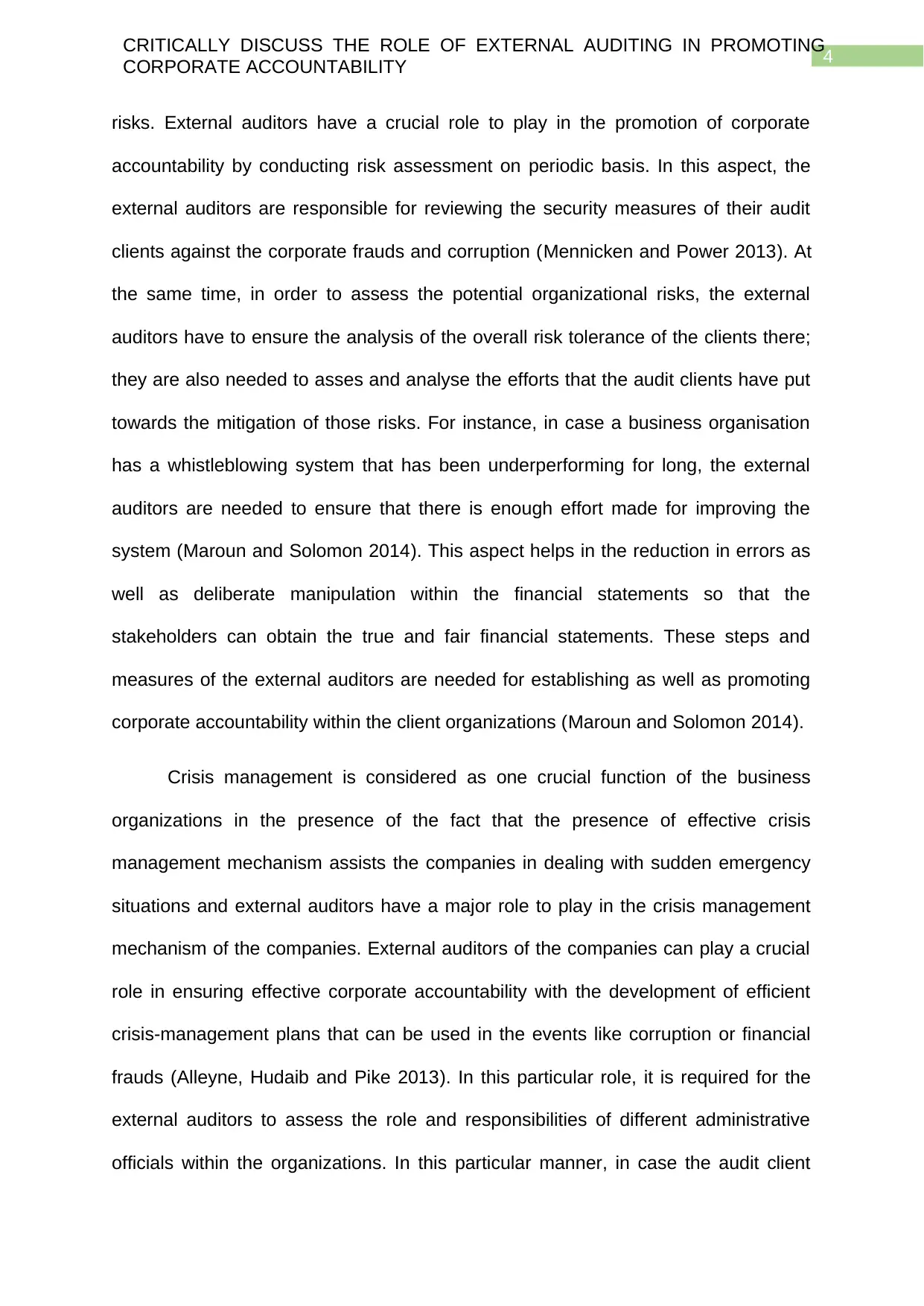
4
CRITICALLY DISCUSS THE ROLE OF EXTERNAL AUDITING IN PROMOTING
CORPORATE ACCOUNTABILITY
risks. External auditors have a crucial role to play in the promotion of corporate
accountability by conducting risk assessment on periodic basis. In this aspect, the
external auditors are responsible for reviewing the security measures of their audit
clients against the corporate frauds and corruption (Mennicken and Power 2013). At
the same time, in order to assess the potential organizational risks, the external
auditors have to ensure the analysis of the overall risk tolerance of the clients there;
they are also needed to asses and analyse the efforts that the audit clients have put
towards the mitigation of those risks. For instance, in case a business organisation
has a whistleblowing system that has been underperforming for long, the external
auditors are needed to ensure that there is enough effort made for improving the
system (Maroun and Solomon 2014). This aspect helps in the reduction in errors as
well as deliberate manipulation within the financial statements so that the
stakeholders can obtain the true and fair financial statements. These steps and
measures of the external auditors are needed for establishing as well as promoting
corporate accountability within the client organizations (Maroun and Solomon 2014).
Crisis management is considered as one crucial function of the business
organizations in the presence of the fact that the presence of effective crisis
management mechanism assists the companies in dealing with sudden emergency
situations and external auditors have a major role to play in the crisis management
mechanism of the companies. External auditors of the companies can play a crucial
role in ensuring effective corporate accountability with the development of efficient
crisis-management plans that can be used in the events like corruption or financial
frauds (Alleyne, Hudaib and Pike 2013). In this particular role, it is required for the
external auditors to assess the role and responsibilities of different administrative
officials within the organizations. In this particular manner, in case the audit client
CRITICALLY DISCUSS THE ROLE OF EXTERNAL AUDITING IN PROMOTING
CORPORATE ACCOUNTABILITY
risks. External auditors have a crucial role to play in the promotion of corporate
accountability by conducting risk assessment on periodic basis. In this aspect, the
external auditors are responsible for reviewing the security measures of their audit
clients against the corporate frauds and corruption (Mennicken and Power 2013). At
the same time, in order to assess the potential organizational risks, the external
auditors have to ensure the analysis of the overall risk tolerance of the clients there;
they are also needed to asses and analyse the efforts that the audit clients have put
towards the mitigation of those risks. For instance, in case a business organisation
has a whistleblowing system that has been underperforming for long, the external
auditors are needed to ensure that there is enough effort made for improving the
system (Maroun and Solomon 2014). This aspect helps in the reduction in errors as
well as deliberate manipulation within the financial statements so that the
stakeholders can obtain the true and fair financial statements. These steps and
measures of the external auditors are needed for establishing as well as promoting
corporate accountability within the client organizations (Maroun and Solomon 2014).
Crisis management is considered as one crucial function of the business
organizations in the presence of the fact that the presence of effective crisis
management mechanism assists the companies in dealing with sudden emergency
situations and external auditors have a major role to play in the crisis management
mechanism of the companies. External auditors of the companies can play a crucial
role in ensuring effective corporate accountability with the development of efficient
crisis-management plans that can be used in the events like corruption or financial
frauds (Alleyne, Hudaib and Pike 2013). In this particular role, it is required for the
external auditors to assess the role and responsibilities of different administrative
officials within the organizations. In this particular manner, in case the audit client
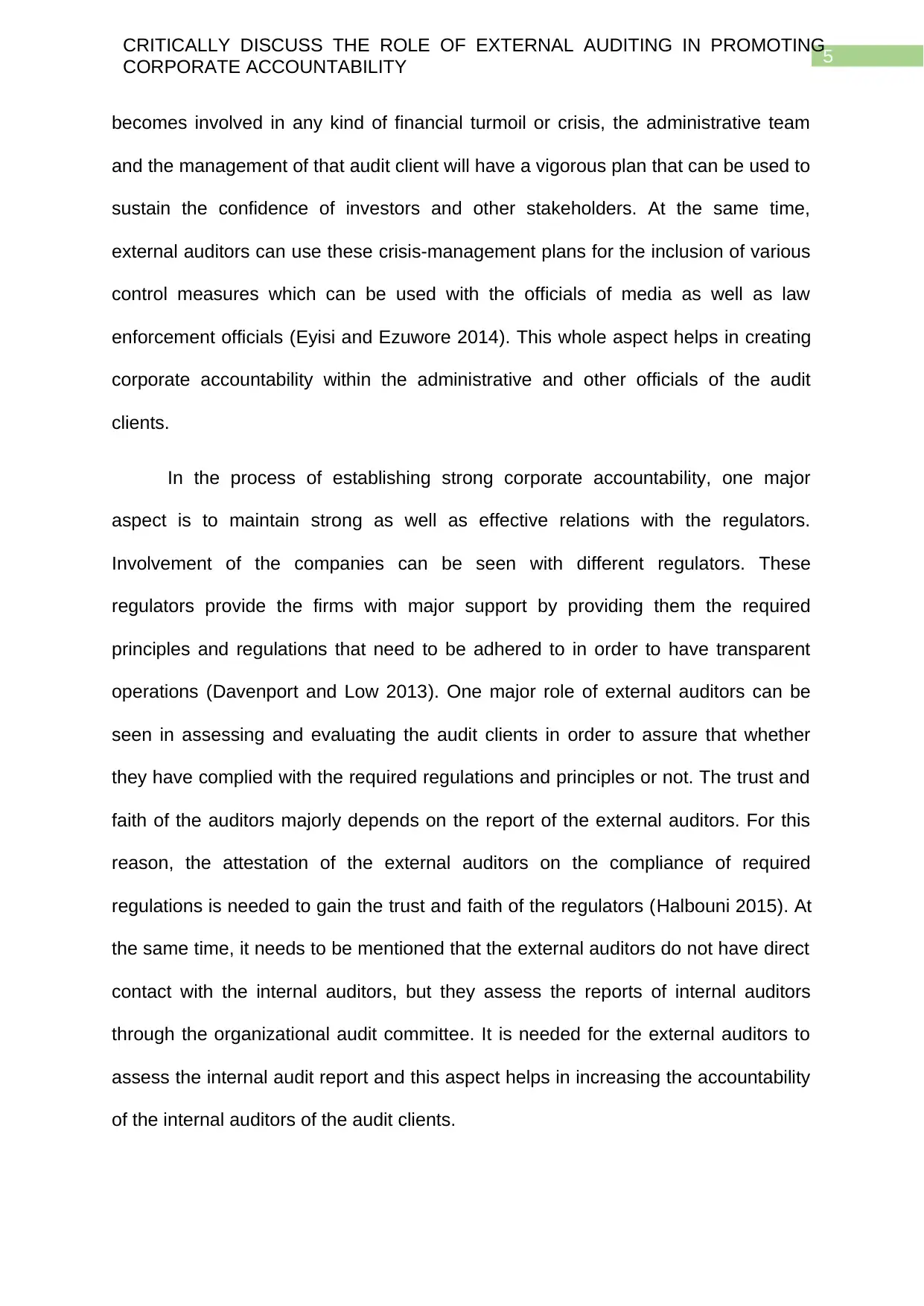
5
CRITICALLY DISCUSS THE ROLE OF EXTERNAL AUDITING IN PROMOTING
CORPORATE ACCOUNTABILITY
becomes involved in any kind of financial turmoil or crisis, the administrative team
and the management of that audit client will have a vigorous plan that can be used to
sustain the confidence of investors and other stakeholders. At the same time,
external auditors can use these crisis-management plans for the inclusion of various
control measures which can be used with the officials of media as well as law
enforcement officials (Eyisi and Ezuwore 2014). This whole aspect helps in creating
corporate accountability within the administrative and other officials of the audit
clients.
In the process of establishing strong corporate accountability, one major
aspect is to maintain strong as well as effective relations with the regulators.
Involvement of the companies can be seen with different regulators. These
regulators provide the firms with major support by providing them the required
principles and regulations that need to be adhered to in order to have transparent
operations (Davenport and Low 2013). One major role of external auditors can be
seen in assessing and evaluating the audit clients in order to assure that whether
they have complied with the required regulations and principles or not. The trust and
faith of the auditors majorly depends on the report of the external auditors. For this
reason, the attestation of the external auditors on the compliance of required
regulations is needed to gain the trust and faith of the regulators (Halbouni 2015). At
the same time, it needs to be mentioned that the external auditors do not have direct
contact with the internal auditors, but they assess the reports of internal auditors
through the organizational audit committee. It is needed for the external auditors to
assess the internal audit report and this aspect helps in increasing the accountability
of the internal auditors of the audit clients.
CRITICALLY DISCUSS THE ROLE OF EXTERNAL AUDITING IN PROMOTING
CORPORATE ACCOUNTABILITY
becomes involved in any kind of financial turmoil or crisis, the administrative team
and the management of that audit client will have a vigorous plan that can be used to
sustain the confidence of investors and other stakeholders. At the same time,
external auditors can use these crisis-management plans for the inclusion of various
control measures which can be used with the officials of media as well as law
enforcement officials (Eyisi and Ezuwore 2014). This whole aspect helps in creating
corporate accountability within the administrative and other officials of the audit
clients.
In the process of establishing strong corporate accountability, one major
aspect is to maintain strong as well as effective relations with the regulators.
Involvement of the companies can be seen with different regulators. These
regulators provide the firms with major support by providing them the required
principles and regulations that need to be adhered to in order to have transparent
operations (Davenport and Low 2013). One major role of external auditors can be
seen in assessing and evaluating the audit clients in order to assure that whether
they have complied with the required regulations and principles or not. The trust and
faith of the auditors majorly depends on the report of the external auditors. For this
reason, the attestation of the external auditors on the compliance of required
regulations is needed to gain the trust and faith of the regulators (Halbouni 2015). At
the same time, it needs to be mentioned that the external auditors do not have direct
contact with the internal auditors, but they assess the reports of internal auditors
through the organizational audit committee. It is needed for the external auditors to
assess the internal audit report and this aspect helps in increasing the accountability
of the internal auditors of the audit clients.
⊘ This is a preview!⊘
Do you want full access?
Subscribe today to unlock all pages.

Trusted by 1+ million students worldwide
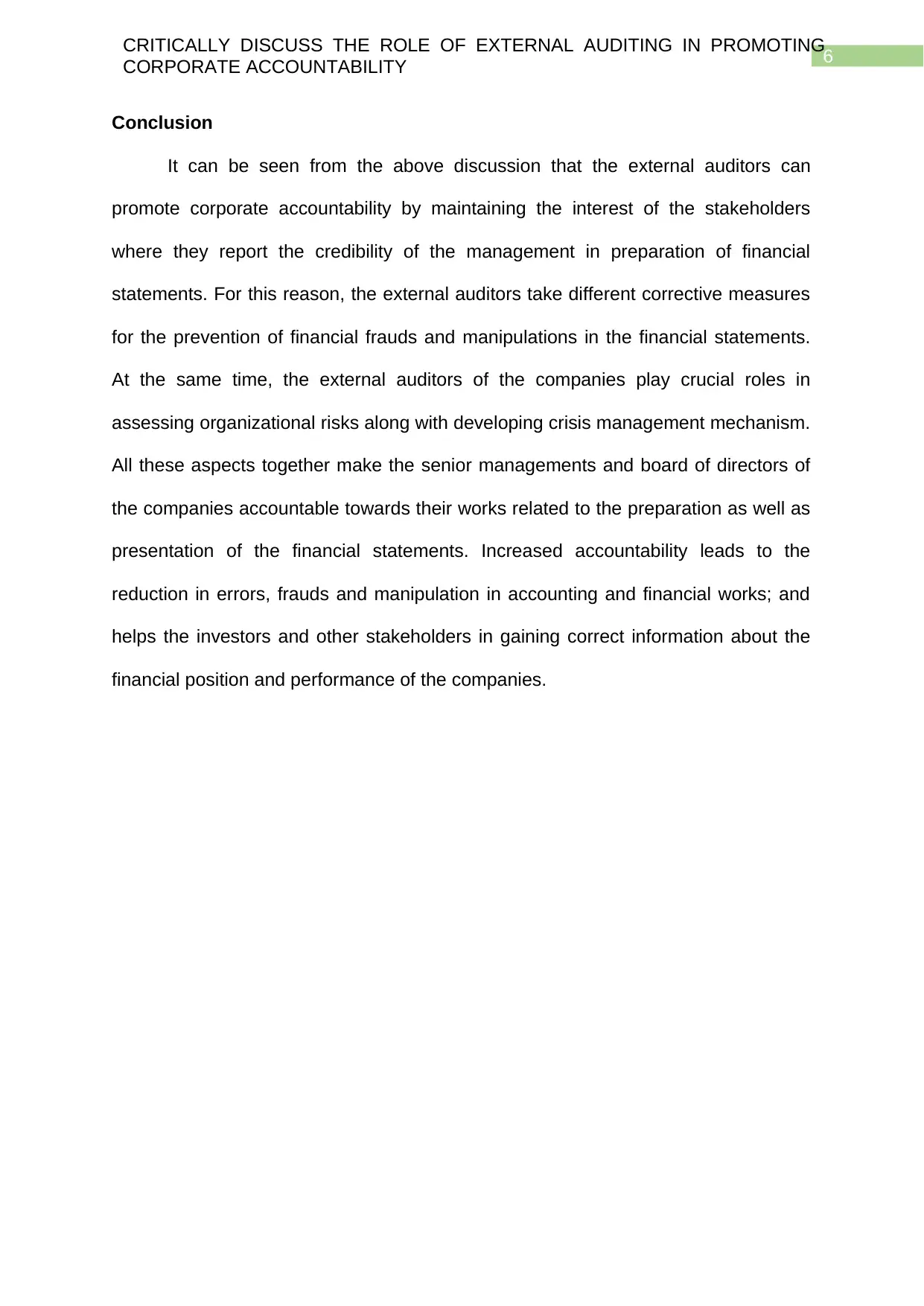
6
CRITICALLY DISCUSS THE ROLE OF EXTERNAL AUDITING IN PROMOTING
CORPORATE ACCOUNTABILITY
Conclusion
It can be seen from the above discussion that the external auditors can
promote corporate accountability by maintaining the interest of the stakeholders
where they report the credibility of the management in preparation of financial
statements. For this reason, the external auditors take different corrective measures
for the prevention of financial frauds and manipulations in the financial statements.
At the same time, the external auditors of the companies play crucial roles in
assessing organizational risks along with developing crisis management mechanism.
All these aspects together make the senior managements and board of directors of
the companies accountable towards their works related to the preparation as well as
presentation of the financial statements. Increased accountability leads to the
reduction in errors, frauds and manipulation in accounting and financial works; and
helps the investors and other stakeholders in gaining correct information about the
financial position and performance of the companies.
CRITICALLY DISCUSS THE ROLE OF EXTERNAL AUDITING IN PROMOTING
CORPORATE ACCOUNTABILITY
Conclusion
It can be seen from the above discussion that the external auditors can
promote corporate accountability by maintaining the interest of the stakeholders
where they report the credibility of the management in preparation of financial
statements. For this reason, the external auditors take different corrective measures
for the prevention of financial frauds and manipulations in the financial statements.
At the same time, the external auditors of the companies play crucial roles in
assessing organizational risks along with developing crisis management mechanism.
All these aspects together make the senior managements and board of directors of
the companies accountable towards their works related to the preparation as well as
presentation of the financial statements. Increased accountability leads to the
reduction in errors, frauds and manipulation in accounting and financial works; and
helps the investors and other stakeholders in gaining correct information about the
financial position and performance of the companies.
Paraphrase This Document
Need a fresh take? Get an instant paraphrase of this document with our AI Paraphraser
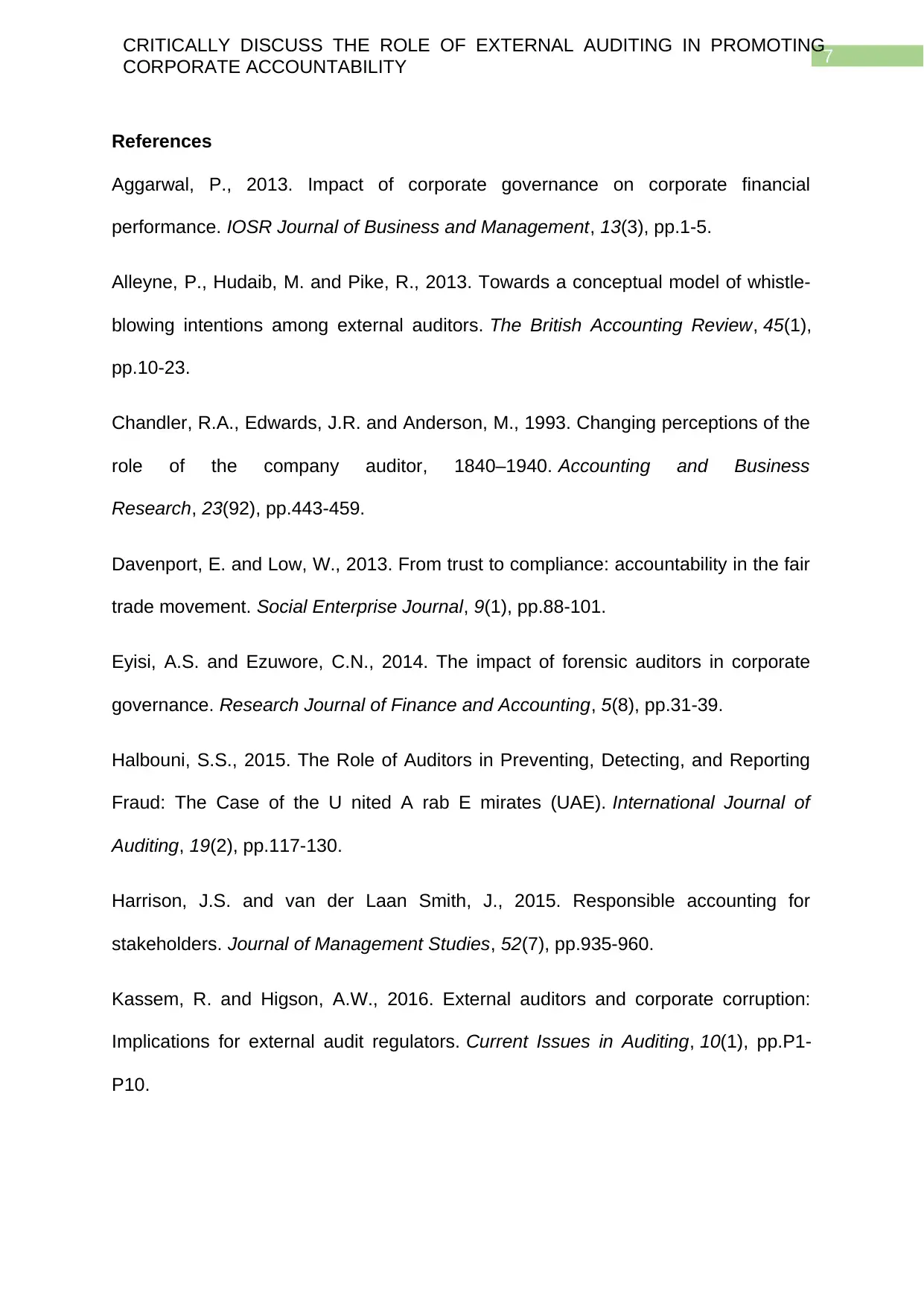
7
CRITICALLY DISCUSS THE ROLE OF EXTERNAL AUDITING IN PROMOTING
CORPORATE ACCOUNTABILITY
References
Aggarwal, P., 2013. Impact of corporate governance on corporate financial
performance. IOSR Journal of Business and Management, 13(3), pp.1-5.
Alleyne, P., Hudaib, M. and Pike, R., 2013. Towards a conceptual model of whistle-
blowing intentions among external auditors. The British Accounting Review, 45(1),
pp.10-23.
Chandler, R.A., Edwards, J.R. and Anderson, M., 1993. Changing perceptions of the
role of the company auditor, 1840–1940. Accounting and Business
Research, 23(92), pp.443-459.
Davenport, E. and Low, W., 2013. From trust to compliance: accountability in the fair
trade movement. Social Enterprise Journal, 9(1), pp.88-101.
Eyisi, A.S. and Ezuwore, C.N., 2014. The impact of forensic auditors in corporate
governance. Research Journal of Finance and Accounting, 5(8), pp.31-39.
Halbouni, S.S., 2015. The Role of Auditors in Preventing, Detecting, and Reporting
Fraud: The Case of the U nited A rab E mirates (UAE). International Journal of
Auditing, 19(2), pp.117-130.
Harrison, J.S. and van der Laan Smith, J., 2015. Responsible accounting for
stakeholders. Journal of Management Studies, 52(7), pp.935-960.
Kassem, R. and Higson, A.W., 2016. External auditors and corporate corruption:
Implications for external audit regulators. Current Issues in Auditing, 10(1), pp.P1-
P10.
CRITICALLY DISCUSS THE ROLE OF EXTERNAL AUDITING IN PROMOTING
CORPORATE ACCOUNTABILITY
References
Aggarwal, P., 2013. Impact of corporate governance on corporate financial
performance. IOSR Journal of Business and Management, 13(3), pp.1-5.
Alleyne, P., Hudaib, M. and Pike, R., 2013. Towards a conceptual model of whistle-
blowing intentions among external auditors. The British Accounting Review, 45(1),
pp.10-23.
Chandler, R.A., Edwards, J.R. and Anderson, M., 1993. Changing perceptions of the
role of the company auditor, 1840–1940. Accounting and Business
Research, 23(92), pp.443-459.
Davenport, E. and Low, W., 2013. From trust to compliance: accountability in the fair
trade movement. Social Enterprise Journal, 9(1), pp.88-101.
Eyisi, A.S. and Ezuwore, C.N., 2014. The impact of forensic auditors in corporate
governance. Research Journal of Finance and Accounting, 5(8), pp.31-39.
Halbouni, S.S., 2015. The Role of Auditors in Preventing, Detecting, and Reporting
Fraud: The Case of the U nited A rab E mirates (UAE). International Journal of
Auditing, 19(2), pp.117-130.
Harrison, J.S. and van der Laan Smith, J., 2015. Responsible accounting for
stakeholders. Journal of Management Studies, 52(7), pp.935-960.
Kassem, R. and Higson, A.W., 2016. External auditors and corporate corruption:
Implications for external audit regulators. Current Issues in Auditing, 10(1), pp.P1-
P10.
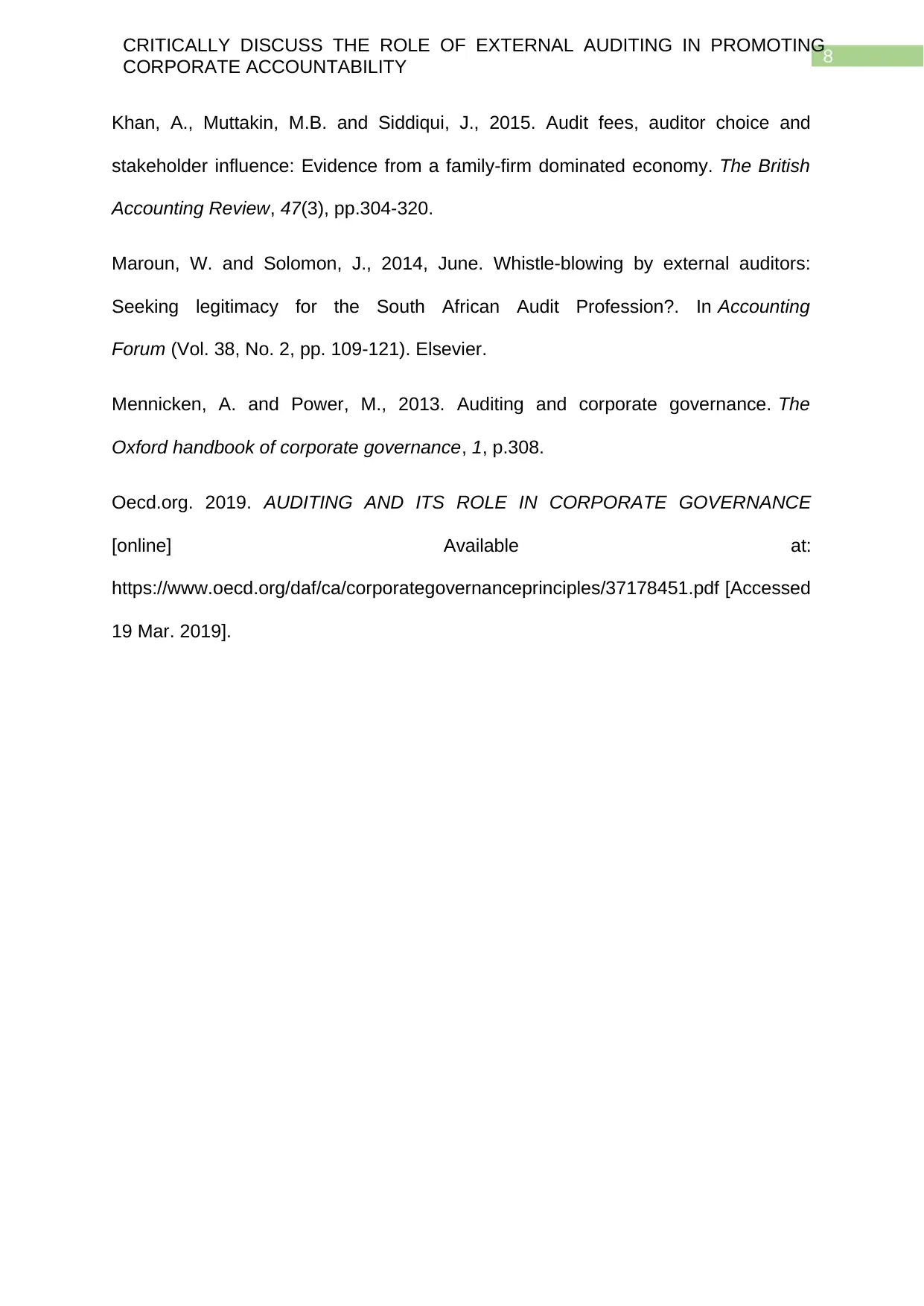
8
CRITICALLY DISCUSS THE ROLE OF EXTERNAL AUDITING IN PROMOTING
CORPORATE ACCOUNTABILITY
Khan, A., Muttakin, M.B. and Siddiqui, J., 2015. Audit fees, auditor choice and
stakeholder influence: Evidence from a family-firm dominated economy. The British
Accounting Review, 47(3), pp.304-320.
Maroun, W. and Solomon, J., 2014, June. Whistle-blowing by external auditors:
Seeking legitimacy for the South African Audit Profession?. In Accounting
Forum (Vol. 38, No. 2, pp. 109-121). Elsevier.
Mennicken, A. and Power, M., 2013. Auditing and corporate governance. The
Oxford handbook of corporate governance, 1, p.308.
Oecd.org. 2019. AUDITING AND ITS ROLE IN CORPORATE GOVERNANCE
[online] Available at:
https://www.oecd.org/daf/ca/corporategovernanceprinciples/37178451.pdf [Accessed
19 Mar. 2019].
CRITICALLY DISCUSS THE ROLE OF EXTERNAL AUDITING IN PROMOTING
CORPORATE ACCOUNTABILITY
Khan, A., Muttakin, M.B. and Siddiqui, J., 2015. Audit fees, auditor choice and
stakeholder influence: Evidence from a family-firm dominated economy. The British
Accounting Review, 47(3), pp.304-320.
Maroun, W. and Solomon, J., 2014, June. Whistle-blowing by external auditors:
Seeking legitimacy for the South African Audit Profession?. In Accounting
Forum (Vol. 38, No. 2, pp. 109-121). Elsevier.
Mennicken, A. and Power, M., 2013. Auditing and corporate governance. The
Oxford handbook of corporate governance, 1, p.308.
Oecd.org. 2019. AUDITING AND ITS ROLE IN CORPORATE GOVERNANCE
[online] Available at:
https://www.oecd.org/daf/ca/corporategovernanceprinciples/37178451.pdf [Accessed
19 Mar. 2019].
⊘ This is a preview!⊘
Do you want full access?
Subscribe today to unlock all pages.

Trusted by 1+ million students worldwide
1 out of 9
Your All-in-One AI-Powered Toolkit for Academic Success.
+13062052269
info@desklib.com
Available 24*7 on WhatsApp / Email
![[object Object]](/_next/static/media/star-bottom.7253800d.svg)
Unlock your academic potential
Copyright © 2020–2026 A2Z Services. All Rights Reserved. Developed and managed by ZUCOL.


